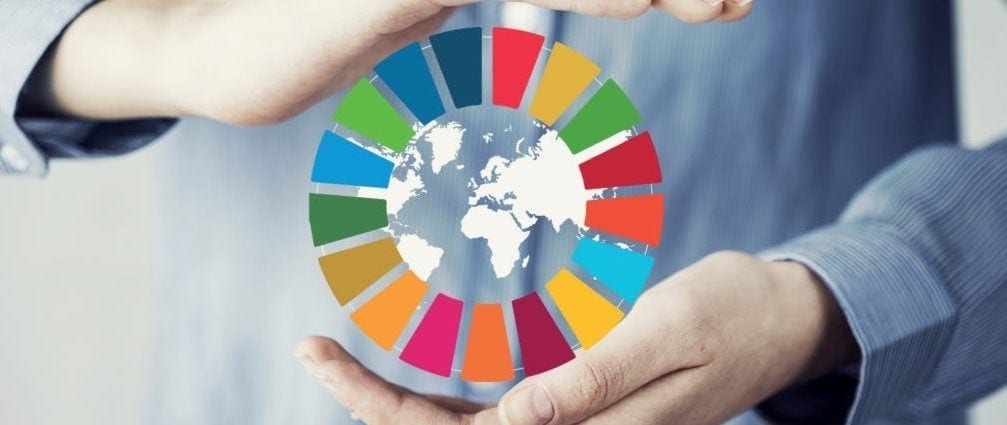
Social Entrepreneurship to Meet the Millennium Development Goals
Corporate responsibility or CR is the concept coined by organizations to incorporate ESG (environmental, social, and governance) concerns into their day-to-day operations and to contribute to the growth of the communities in which they operate. In the framework of this corporate responsibility, social entrepreneurship programs enable companies to promote innovative initiatives that impact society and the environment.
29 of July of 2019
The world is in the middle of a total transformation. Looking for effective solutions to climate change, social and economic inequality, poverty, hunger, sustainability for production systems and consumer habits, and justice have become a priority for society worldwide. To these ends, the 17 Sustainable Development Goals (SDGs) and their 169 objectives have a central place in government, regulatory, investor, and consumer agendas. It is an ambitious challenge, known as the 2030 Agenda, that 193 member states of the United Nations agreed to take on in 2015.
The SDGs are obviously global objectives, but to meet them, we must take local actions that carry us in the direction that these goals indicate. Regulatory pressure and growing awareness among investors and clients are causing companies to shift their focus away from the stockholder to “a greater number of interest groups impacted by business activity,” as a recent report published by Forética highlights. In this sense, the consulting firm PWC affirms that 72% of companies mention the SDGs in their annual reports, 50% have indicated that they have been prioritized, and 19% of CEOs mentioned them in their presentations. The data backs up this global trend.
Environmental, social, and governance criteria in company management
Corporate responsibility (CR) has arisen in order to respond to society’s growing demand regarding businesses with more social, sustainable values. It involves voluntary involvement in so-called ESG concerns – environmental, social, and governance – of the previously mentioned interest groups in day-to-day operations. The objective of this focus on CR is generating a positive, lasting impact in the communities where each organization operates, as opposed to other alternative focuses linked to reputation that typically appear in politically correct institutional statements. Harvard professor Michael Porter has already stated that “businesses that have creating shared value as a strategy are the ones that will be successful.”
Following in this line of work, here at Ferrovial Services we’ve recently launched the Strategic Plan for Corporate Responsibility and Social Innovation in Spain. This plan, designed from analyzing our activities and the concerns identified by our interest groups, and aligned with Ferrovial’s strategic plan for Corporate Responsibility, defines six major lines of work to develop in the coming years:
- Promoting labor partner integration from groups at risk of social exclusion, with initiatives that have already been set up, like the Escuelas de Oficios, which provides training in professions developed by the company for individuals at risk of social exclusion.
- Halting climate change by reducing carbon footprints and fostering circular economy.
- Focusing on social action in municipalities where we operate.
- Taking care of the professional development and well-being of our employees.
- Launching a CR management system that guarantees the company’s good governance and that enables us to be the first Ibex-35 company to obtain SGE21 certification, and
- Incentivizing social innovation, as we will outline in the next few paragraphs
The current challenge is raising awareness among the more than 38,000 employees on the company’s staff in Spain as participants and ambassadors, promoting the incorporation of “ESG” criteria in decision-making at every level, from setting up a new service to designing financial procedure.
How to improve society through social entrepreneurship
At the organization, we’ve been committed to innovation by incorporating professionals with disruptive profiles for many years, from launching internal and external contests for ideas to setting intrapreneurship or employee training programs in motion. This strategic commitment allows us to generate a positive impact in urban environments where we provide services: social and professional integration, energy efficiency projects, circular economy initiatives, etc. … If we add the organization’s commitment to the “SDGs” to our track record, Ferrovial Services’ support and involvement in the Gamechangers & Cities program is inevitable, a program we’ve launched together with UnLtd Spain and the Camilo José Cela University. This program incentivizes social innovation, one of the strategic lines of the plan that fulfills our commitment to sustainable communities or cities.
This program is aimed at entrepreneurs interested in social impact, that is, startups that have, in addition to the objective of sustainability from a financial point of view, a complementary goal of transforming cities by generating a positive impact for society or the environment. The 2019 convocation, the first held in Spain, focused on resolving five major challenges associated with cities: mobility, energy, sustainable urbanism, circular economy, and equity. In all, more than 100 projects expressed interest in participating in this program. A multidisciplinary jury identified 10 projects to participate in the acceleration or development phase (you can find a brief description of these projects at this link), which will last for 6 months.
During this period, Ferrovial Services employees act as mentors for each of the initiatives, and other professionals are participating by giving workshops on specific fields of knowledge that are shared across all of the projects (as well as other development channels run by UnLtd Spain and its extensive network of partners).
Participation in this project has brought us a series of benefits that I will sum up in three points: in the first place, identifying and developing business opportunities associated with the concerns of interest groups; secondly, moving further in our cultural evolution toward being a more innovative, sustainable organization; and lastly, boosting company pride among employees. This is an example of how social entrepreneurship, innovation, and intrapreneurship accelerate the growth of businesses in the short and medium terms, and how they contribute to building an environment of innovation by collaborating with other organizations and interest groups.
I would like to conclude this article by quoting expert Peter Bakker, president and CEO of the World Business Council for Sustainable Development, who assures that the SDGs “represent an ambitious and transformative agenda.” The companies must take on a proactive role in leading this transformation and situating the SDGs as a strategic lens at the heart of their operations in order to identify market opportunities, anticipate and manage potential risks, and guarantee the sustainability of their operations, Bakker remarks. In short, programs like Gamechangers & Cities that support entrepreneurial initiatives related to dependence, mobility, environment, etc. are part of the contribution that large companies can make to the development and implementation of innovative solutions for society’s concerns, which are reflected in the United Nations SDGs. A challenge that is global and local. A challenge for all of us.





There are no comments yet